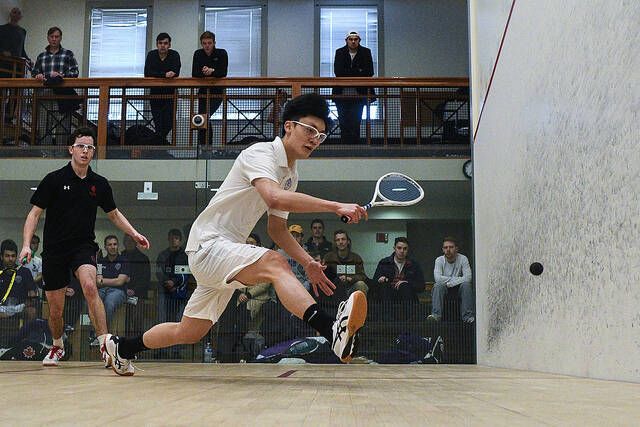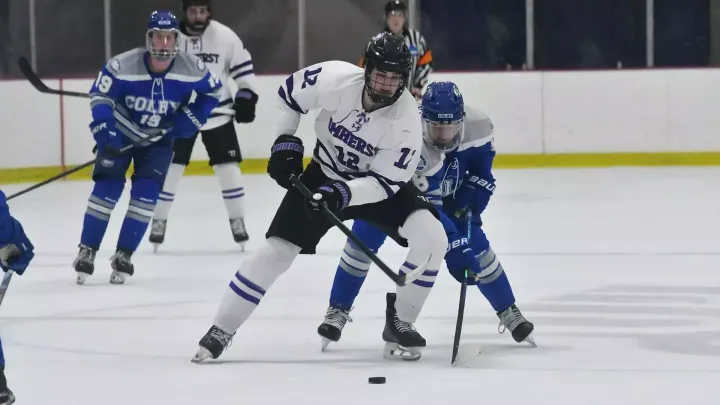Men’s Squash Places Expected Sixth at Team Nationals

Sophomore Terrance Wang, first on the Mammoths’ ladder, sent the small rubber ball– already hot from warm-ups– hurtling towards the Bulldog face plastered on the wall. With that, the Mammoths’ final tournament of the year began.
On Presidents’ Day weekend, 57 squash teams from around the country descended upon Yale for the 2019 College Men’s Team National Championships. This all-important, three-day, season-ending tournament was held, fittingly, in one of the most prestigious gym facilities in the country: the nine-story Payne Whitney Gymnasium.
Teams vied for the championship throughout seven divisions, each containing eight teams of similar caliber selected by the College Squash College. At one end, in the top bracket, the perennially dominant teams from the Ivy League battled for the Potter Cup, the highest honor in men’s collegiate squash. At the other end, in the seventh division, teams competed for the relatively less-renowned Hawthorn Cup. Towards the top of the pack, the Amherst Mammoths competed in the third division for the Summers Cup, seeded sixth out of the eight teams.
Action began early on Friday morning as the Mammoths’ faced Brown, its first opponent. At 7-8, Amherst posted a better record on the season than the Bears (5-9), but their challenging Ivy League competition prepared them well for the postseason, and perhaps hid the real talent of the Brown squad.
Despite facing a hardened opponent, the Mammoths found ways to win on the first, fourth and sixth courts. Wang, despite dropping the first set by a score of 2-11, found his groove in the second and won out to the tune of 11-6, 11-6 and 11-9.
According to Reginald Brewster ’21, head coach Peter Robson’s focus in recent weeks had been on holding steady under stress and winning the “big points.” True to form, the most exciting match of the day took place on the fourth court, where first-year Robinson Armour took down his Brown opponent Philip Demeulenaere in four sets. Like Wang, Armour started shakily with a 7-11 loss in the opening set. The next three sets were each decided in extra points, Armour battling hard and pulling all three out by two points: 13-11, 12-10, 12-10.
Finally, on court six, senior captain David Merkel was able to pull out a victory in the final important match of his career. Despite a challenge in the third set, he won relatively handily with scores of 11-5, 11-9, 10-12 and 11-7.
With a 3-6 loss in the first round of the tournament, the Mammoths were shunted to the consolation bracket, but still had much to fight for as they played against two familiar NESCAC foes. They first faced Bowdoin, who they had already beaten twice this season. The Mammoths won on all courts except seven and eight, and four of the matches were sweeps. With a 7-2 victory, Amherst carried some momentum into their next match against Bates. In two previous meetings this year, the Bobcats triumphed over Amherst, so the Mammoths were looking for revenge. They were met with stiff resistance yet again and consistent play by the Bates players. Rather than improving on the 4-5 loss at NESCACs, the Mammoths, after a long weekend of tough play, faltered and dropped six of nine matches against Bates.
Despite a disappointing end to the season, Robson, Merkel and captain Harith Khawaja ’19 all stressed something more than simply winning. Robson noted that the squad had improved from No. 26 preseason ranking to No. 22 by the end of the season.
“We worked harder this year than we ever have and it paid off,” Merkel said. “We finished higher in the national rankings than last year and the year before that.”
While the season can often exasterbate a “win now” mindset, coaches and captains attempted to keep the team and young players focused on a bigger goal: improvement from year to year. With this goal in mind, Robson noted several improved players on the season: first years Charles Sutherby and Armour, playing number three and number four respectively. Accompanied by many sophomores in the starting ladder, the future looks bright for the Mammoth squash team.
On the season as a whole, Khawaja finished by saying: “we managed to turn around our culture. We’ve never been closer as a team and this has led to a culture of dedication, accountability and success.”




Comments ()